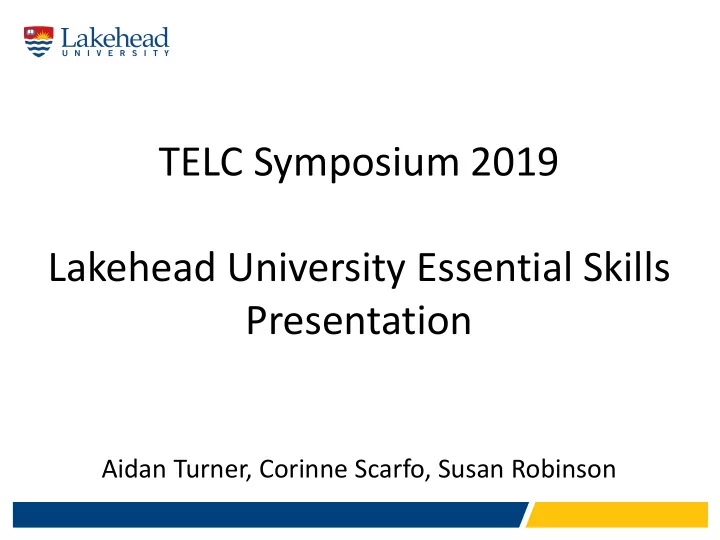

TELC Symposium 2019 Lakehead University Essential Skills Presentation Aidan Turner, Corinne Scarfo, Susan Robinson
The Purpose of the Essential Skills • To provide information to prospective TCs so they can make an informed decision when applying • To guide TCs towards the essential skills and performance expectations • To help provide prospective and current TCs with information to decide if they should register with Student Accessibility Services • To protect the safety of learners and their learning. 2
Areas of Growth • On-going professional development with staff • Constant reflection on Essential Skills • Looking at examples • Increased documentation for staff, however exemplars are provided • Meant as a proactive measure for the students to determine if the profession is right for them. 3
What supports are established for the TCs? • When a student is unsuccessful in the area of Essentials Skills, what happens? • Dean has final say • Probation-with an outline of what needs to happen in order for student to be successful • -support with mental health and wellbeing • -increase attendance (student success) • -Academic issues (Tutoring) • -Enhanced practicum supports 4
What supports are established for the TCs? • -Academic issues (Tutoring) • -Enhanced practicum supports • -Accommodation within the program (Accessibility Dept.) • -Post placement meetings (provide resources and steps to determine progress) 5
ESSENTIAL SKILLS IN COURSE WORK AND ON PLACEMENT EXAMPLES Specifically, the teacher candidate demonstrates: The examples do not represent an exhaustive list of expectations, but provide a sample to assist with interpretation. Requirement 1: COMMUNICATION SKILLS Teacher candidate communicates clearly, non-verbally and verbally (in the language of instruction, orally and in writing), in various contexts. Requirement 2: INTRA- AND INTER-PERSONAL SKILLS Teacher candidate interacts appropriately with others. Requirement 3: COGNITIVE AND METACOGNITIVE SKILLS Teacher candidate learns, and recalls in a timely manner, the discipline’s content and points of understanding (concepts, postulates and methods), and demonstrates effective executive functioning skills (e.g. planning, problem solving, and self- control). Requirement 4: SUPERVISION SKILLS Teacher candidate maintains awareness of others so as to ensure a safe environment. 6
1. COMMUNICATION SKILLS • Teacher candidate communicates clearly, non- verbally and verbally (in the language of instruction, orally and in writing), in various contexts. 7
COMMUNICATION SKILLS • Speaks with appropriate volume, vocabulary, and expression in the language of instruction. • Communicates effectively to provide instructions and direction that can be understood by others. • Gives instructions that are clear, specific, and concise. • Solicits feedback from the audience to check for understanding. • Gives examples and/or alternatives when providing instructions. • Acts on instructor and/or associate teacher feedback in a manner that shows s/he has understood and considered suggestions for improvement. 8
2. INTRA AND INTER PERSONAL SKILLS • Teacher candidate interacts appropriately with others. 9
INTRA AND INTER PERSONAL SKILLS • Maintains appropriate interpersonal boundaries. • Refrains from speaking about others negatively (gossip) or sharing others ’ personal information . • Maintains professional boundaries across all forms of media. • Works cooperatively and effectively with others. • Uses appropriate words, phrases, and terminology, including inclusive and non-discriminatory language. • Presents and promotes a calm demeanour and models effective behavioural strategies and inclusionary practices. 10
3. COGNITIVE AND METACOGNITIVE SKILLS • Teacher candidate learns, and recalls in a timely manner, the discipline’s content and points of understanding (concepts, postulates and methods), and demonstrates effective executive functioning skills (e.g. planning, problem solving, and self-control). 11
COGNITIVE AND METACOGNITIVE SKILLS • Learns new material on a given topic within a subject to the level (depth and breadth) required for instruction. • In the primary-junior division, achieves a minimum proficiency of 75% on the Primary-Junior division Math Competency Exam. • Sets goals, prioritizes, and makes decisions to complete program requirements to meet deadlines (e.g. assignment deadlines, documentation for placement, and lesson plan submission during placement). • Uses effective time management strategies to meet program requirements (including regular attendance and punctuality). 12
4. SUPERVISION SKILLS • Teacher candidate maintains awareness of others so as to ensure a safe environment. 13
SUPERVISION SKILLS • Establishes a comfortable and safe learning environment, attends to the learners and their environment, and takes appropriate action in order to maintain a safe environment. • Establishes and practices clear rules and routines to promote a safe and inclusive learning environment. • Maintains focus on the students and the environment despite interruptions and distractions. • Is flexible in the face of interruptions and distractions. • Moves about the classroom, manages materials and supplies, and supervises learners during classroom activities. 14
CONTACT Dr. Wayne Melville Professor of Science Education Chair of Undergraduate Studies in Education Faculty of Education Lakehead University wmelvill@lakeheadu.ca Ph. 1 807 766 7194 Dr. Laurie Leslie Professional Experiences Coordinator Lakehead University Faculty of Education leleslie@lakeheadu.ca Ph. 1 807 343 8712 15
Recommend
More recommend